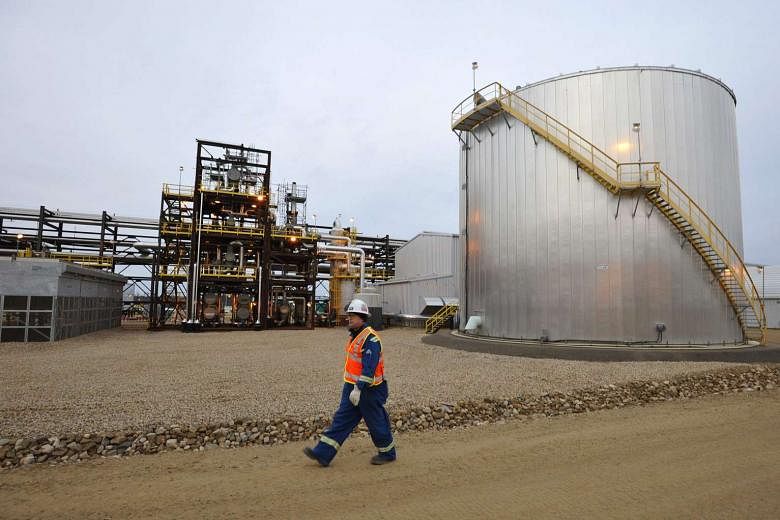CALGARY (REUTERS)- The Canadian province of Alberta, holder of the world's third-largest oil reserves, has proposed a new climate change plan that will give efficient oil-producing companies room to grow while cutting carbon emissions, experts and stakeholders said on Monday (Nov 23).
Long criticised as a source for "dirty oil" because most of the reserves are heavy bitumen deposits found in the province's oil sands, Alberta's left-leaning government created an unlikely partnership between oil industry executives, indigenous leaders and prominent environmentalists to forge the accord.
The proposal comes as world leaders prepare to discuss plans to prevent global temperatures from rising more than 2 degrees Celsius above pre-industrial levels at a summit in France starting Nov 30.
It also came as Prime Minister Justin Trudeau met with provincial and territorial leaders to hammer out Canada's position at the meeting, to be held at Le Bourget, north of Paris.
"I'm convinced that the oil sands CEOs understand that you can't be the high cost, high carbon producer in the world anymore," said Ed Whittingham, executive director of the Alberta-based Pembina Institute. "It was all a very tight timeline, because obviously, the premier wanted this announcement in the bag... before she goes to Paris," he added.
The oil sands, natural deposits of tar-like heavy oil, are a key driver of the Canadian economy and put the province's reserves behind only Venezuela and Saudi Arabia.
But environmentalists have criticised the industry's energy intensive production process, which makes it Canada's fastest growing source of greenhouse gas emissions.
Whittingham said many senior company executives have accepted, in part due to lower global oil prices, that they must reduce their carbon footprint as well as high production and energy costs in order to be more successful. To that end, the plan foresees an end to coal-fired power generation and a carbon price of C$30 (S$32) per tonne.
The proposal also includes exemptions for upgrading facilities to encourage new investments within Alberta and comes after Premier Rachel Notley's government, which won an election in May to end 44 years of Conservative rule, was stung with the United States' rejection of TransCanada Corp's Keystone XL pipeline. Notley called that decision a "kick in the teeth."
Paul Boothe, who was the top bureaucrat in Canada's federal environment department as it developed the country's emissions standards for coal-fired power plants and its attempt to draft similar oil and gas regulations, said Alberta has taken an important first step with the plan.
He said the proposal helps firms make a transition with what he described as "subsidies" for the best-performing companies. "Basically, it gives back to (companies), some of the carbon tax that they pay," said Boothe, now an economics professor at the University of Western Ontario.
"The least-emitting firms do the best, and the top-emitting firms don't do as well... So I think that frankly, the oil and gas industry did very well in this announcement." At least six energy companies - Canadian Natural Resources Ltd, Cenovus, Enbridge Inc, Royal Dutch Shell Plc, Suncor Energy and TransCanada Corp - publicly supported the plan.
Two other companies - Imperial Oil Ltd and Canadian Oil Sands Ltd - declined to say whether they supported or opposed the proposal. Husky Energy Inc said it would continue to work constructively with the province.
"What's critically important here is there's no cap on production, it's a cap on emissions," said Cenovus president Brian Ferguson in a CBC radio interview on Monday (Nov 23).
Notley must still unveil full details about how much space each company would get in a proposed 100 million ton annual cap on oil sands carbon emissions - an increase of about 40 per cent above current annual emissions - as well as incentives to eliminate pollution from coal-fired power plants by 2030.
"These things don't pop up overnight," said Alberta Environment Minister Shannon Phillips at a news conference in Edmonton on Monday (Nov 23). "They are the product of negotiations and I think that what we have been able to achieve here is an historic agreement and a significant path forward to de-escalate conflict over Alberta's energy resources."

